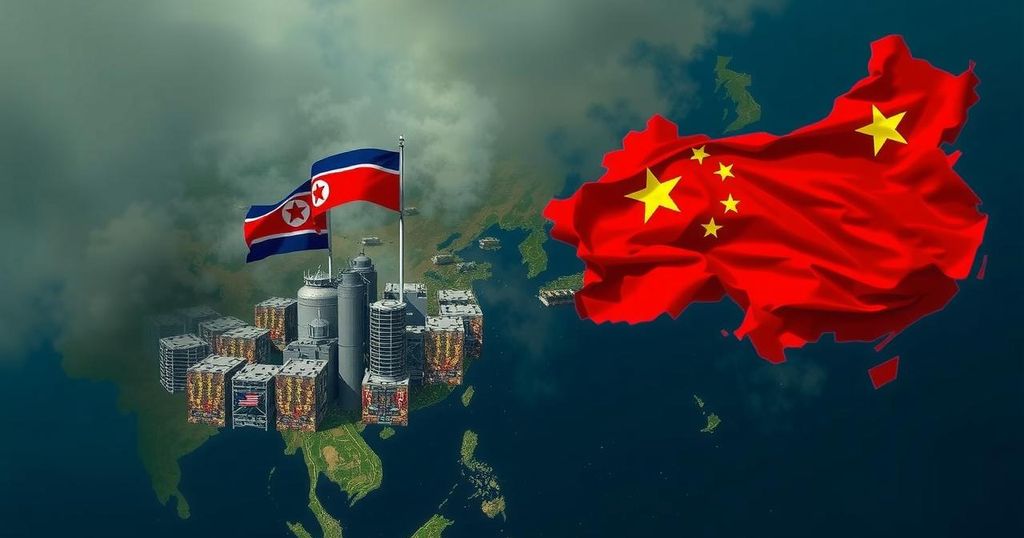North Korea’s Troop Deployment to Russia Challenges China’s Diplomatic Strategy

North Korea’s deployment of over 10,000 troops to Russia amid the Ukraine conflict has sparked global concern. Chinese President Xi Jinping faces pressure from international leaders to intervene and persuade North Korea to cease these military operations. This situation complicates Xi’s delicate balancing act between maintaining relationships with Russia and North Korea while addressing the West’s apprehensions regarding the escalating conflict.
Recent troop deployments from North Korea to Russia, where over 10,000 soldiers are reportedly aiding the efforts in Ukraine, have raised concerns among China’s key trading partners. Chinese President Xi Jinping faces pressure to leverage his influence over North Korea to halt this military support during significant global summits in Brazil and Peru. Leaders from Germany, South Korea, and the United States have expressed their apprehensions, indicating that such actions escalate regional tensions. Xi’s statements advocating for peace and dialogue underscore his balancing act amid increasing tensions between Russia and the West.
Xi’s position is complicated by the growing military ties between North Korea and Russia, as well as the potential repercussions this could have on China’s domestic and international standing. As various global leaders articulate their concerns during recent high-profile meetings, Xi is finding it difficult to denounce Kim Jong Un’s decisions without jeopardizing China’s relationship with both North Korea and Russia. Although Ukrainian President Volodymyr Zelenskyy estimated that North Korea could mobilize up to 100,000 soldiers, China’s reticence to confront its partners about this military cooperation further complicates the situation.
Moreover, amidst geopolitical tensions, China is also wary of alienating both Russia and North Korea, particularly given the potential for escalating tensions with the United States. Analysts have noted that China’s prior calls for de-escalation contrast sharply with the ongoing military engagements involving North Korean troops in Ukraine. Xi’s administration is trying to negotiate a path that maintains economic stability while addressing international concerns.
Despite public statements aimed at fostering dialogue, China appears reluctant to exercise its limited leverage over North Korea. According to experts, such restraint is partly due to intensifying U.S.-China tensions, highlighting Beijing’s concern over the broader implications of its foreign policy. Although Xi may show a commitment to supporting Russia in the international arena, hesitation about openly endorsing military aggression persists, reflecting the complexity of China’s diplomatic stance.
In conclusion, while Xi Jinping advocates for peace and dialogue, the deployment of North Korean troops into the Ukrainian conflict represents a challenging dilemma. The delicate balance that Beijing seeks to maintain between its alliances with Russia and North Korea while addressing the concerns of the international community suggests that any resolution will require careful negotiation and strategic maneuvering.
The deployment of North Korean troops to Russia has become a significant geopolitical issue, particularly as it relates to the ongoing war in Ukraine. This situation has drawn the attention of several international leaders, including those from Germany, South Korea, and the United States, pressing Chinese President Xi Jinping to utilize his influence over North Korea. Xi is in a precarious position as he attempts to maintain strong relationships with both Russia and North Korea while addressing the escalating tensions with Western nations regarding the conflict in Ukraine.
In summary, the situation surrounding North Korea’s troop deployments to Russia presents a considerable challenge for Chinese diplomatic efforts. Xi Jinping’s balancing act between maintaining alliances with Russia and North Korea while addressing international pressures demonstrates the complexity of contemporary geopolitical relationships. As the global community continues to call for de-escalation, China’s role in shaping North Korea’s actions will be crucial in determining regional stability moving forward.
Original Source: www.voanews.com








